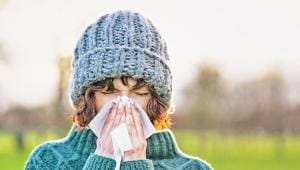Is stress wrecking your immune system?
Stress! It is the constant hum in the background of modern life—whirring through overflowing inboxes, surprise bills, and an endless scroll of bad news.
17 May 2025, 18:12 PM
Simple mindfulness techniques for stress relief and better well-being
Mindfulness is a powerful practice that can enhance mental and physical health.
19 April 2025, 18:00 PM
Ramadan bazaar food safety: Battling high temperatures for hygiene and health
Ramadan bazaars are a cherished part of the fasting month, offering a variety of meals for iftar.
15 March 2025, 18:00 PM
Unravel the mystery of your symptoms!
When it comes to sneezing, coughing, and stuffy noses, many people often wonder whether they are dealing with a cold or allergies.
4 January 2025, 18:00 PM
Does my medical condition affect my anger?
Experiencing anger is a natural part of being human, but frequent and intense outbursts can harm both your health and relationships. Understanding the possible underlying medical reasons for your anger can help you address the issue effectively. .Dementia and anger .Various forms of
28 September 2024, 18:33 PM
The vaping trap
The prevalence of vaping among young people and adolescents has significantly increased.
30 December 2023, 18:00 PM
Understanding Diabetes 1.5: A closer look at a less prevalent type of diabetes
Diabetes is a common health condition that affects many people worldwide. There is a type of diabetes called “Diabetes 1.5” or “Latent Autoimmune Diabetes in Adults” (LADA) that many people may not know about. Based on certain studies, LADA might make up approximately 5% to 10% of the total number of diabetes cases.
22 July 2023, 18:00 PM
Defeating dengue
Dengue is a viral disease that is mostly spread by the bites of sick Aedes mosquitoes, especially Aedes aegypti. Mosquitoes get the dengue virus when they feed on people who already have it in their blood.
15 July 2023, 18:00 PM
Sleepless nights understanding the causes, risks, and treatments for insomnia
Insomnia is a widespread sleep disorder that affects millions of people worldwide. The National Sleep Foundation recommends that adults get an average of 7-9 hours of sleep per night, yet research suggests that up to 30% of adults experience some degree of insomnia, with women being more likely to be affected than men.
8 April 2023, 18:00 PM
Why women get emotional during PMS: factors & strategies for coping
Premenstrual syndrome (PMS) is a common condition that affects many women of reproductive age. While physical symptoms such as bloating and cramping are well-known, emotional symptoms during PMS are often overlooked. Emotional symptoms can include irritability, mood swings, anxiety, and depression, and they can have a significant impact on a woman’s quality of life.
4 March 2023, 18:00 PM
Benefits of brisk walking for diabetic patients
For people with diabetes, walking is a great way to get some exercise that is both simple and effective. But we all share the belief that regular, anytime walking is beneficial for managing diabetes. However, recent studies have suggested that brisk walking may have more health benefits than walking at a normal pace.
4 February 2023, 18:00 PM
Consider your child’s exposure to indoor air pollution
Indoor air pollution is a serious problem in developing nations because of stoves, secondhand smoke, dust mites, mold, bacteria, cleaning products, and more. These sources release volatile compounds. The most studied indoor air pollutant is nitrogen dioxide (NO2). These pollutants can harm women and small children who spend most of their time at home.
28 January 2023, 18:00 PM
Help new mothers feel less sad by encouraging them to breastfeed!
Postpartum depression (PPD), often known as “baby blues,” may occur among new mothers after giving birth. PPD can make a mother depressed, hopeless, lose interest in activities, and have problems connecting with their infant.
21 January 2023, 18:00 PM
Third-hand smoke and its harmful effects on children
The dangers of smoking and exposure to smoke have been well-documented for many years. Researchers have recently discovered third-hand smoke. It is the residue of tobacco smoke that remains on surfaces and in the air after a cigarette is smoked. It sticks to almost everything in a smoking area, including skin, hair, clothes, furniture, floors, dust, car seats, and pet hair and feathers. Inhaling third-hand smoke gases or touching contaminated surfaces can expose people to these chemicals.
14 January 2023, 18:00 PM





















